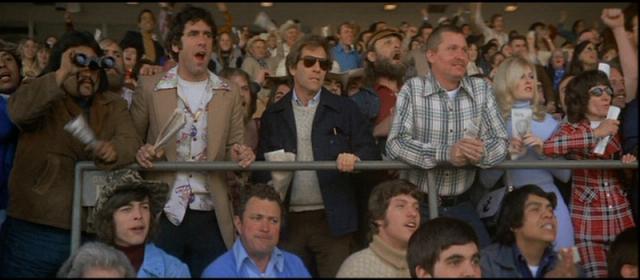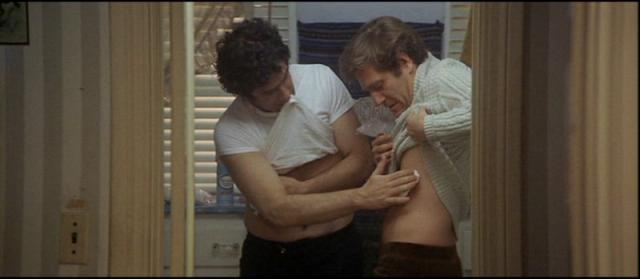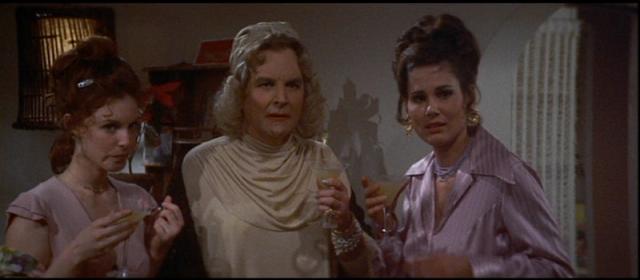|
Genres, Themes, Actors, and Directors:
- Elliott Gould Films
- Gambling
- George Segal Films
- Jeff Goldblum Films
- Robert Altman Films
Review:
California Split remains an impressive, little known entry in Robert Altman’s career. While certain scenes towards the beginning tend to drag a bit — leading one to wonder where the episodic film is headed — eventually Joseph Walsh’s deceptively clever screenplay sneaks up on you, and by the end it packs an unexpected wallop. A large part of the film’s success is due to its lead performers, who are both perfectly cast in their respective roles: we fully believe that Gould (irreverent as ever) is someone who might wile away his days chasing gambling leads, while Segal (a magazine editor by day) is an essentially strait-laced individual who finds himself caught up in something much bigger and more addictive than he could ever have imagined.
As always in Altman’s films, the roster of supporting performances add indelibly to the movie’s richness and charm. In this case, Ann Prentiss (Paula Prentiss’s sister — their resemblance is uncanny) and Gwen Welles shine as a pair of “happy hookers” who take on decidedly unusual jobs — including, in one of the film’s funniest sequences, spending “quality time” with an “elegant” transvestite (Bert Remsen). Welles’ romantic interest in Segal — and the ultimate outcome of their potential tryst — is handled especially well. Equally impressive is Altman’s ability to evoke the various milieus of the gambling world — poker halls, race tracks, boxing rings, casinos — with characteristic attention to detail; throughout the film, we genuinely believe we’re “there”, wherever we are.
Towards the end, California Split becomes somewhat challenging to sit through, simply because we feel such anxiety about Segal’s situation (he owes a loan shark, played by screenwriter Walsh, $2200 — but instead of paying him off once he secures the funds by selling his car, he goes to Reno to gamble instead). Ultimately, however, this simply demonstrates how well Altman has done his job: we really get it that gambling is an addiction like any other, one that has the potential to ruin lives within just a few short hours. It’s a good thing Altman made this one a comedy rather than a tragedy, or we’d really be clenching our teeth.
Redeeming Qualities and Moments:
- A fascinating portrayal of the world of compulsive gambling

- George Segal and Elliott Gould as Bill and Charlie

- Ann Prentiss and Gwen Welles as Barbara and Susan

- Many fine smaller supporting performances
Must See?
Yes, as a cult film by a master director.
Categories
- Cult Movie
- Important Director
Links:
|
One thought on “California Split (1974)”
Not must-see. Not that it’s a bad film – but, as one of Altman’s numerous ventures into the lives of those who prefer living on the edge, this one is particularly challenging… even a bit of a chore at times, though thankfully there’s a satisfying pay-off.
It’s absolutely true that “eventually Joseph Walsh’s deceptively clever screenplay sneaks up on you, and by the end it packs an unexpected wallop.” And I’ll concede the film’s richness – seedy though it is. But I don’t really see any charm here, nor do I really think the film is a comedy. There is definitely a lot of tension – almost from the get-go – and it really doesn’t let up.
Well, it does – a little – for the segue into the ‘world’ of Remsen’s Helen Brown. But even poor ‘Helen’ is a bit of a victim (~even though the treatment of ‘her’ is not vicious or particularly mean-spirited on Altman’s part).
It’s unfortunate that Prentiss and Welles are ultimately disposable in terms of the storyline – because their supportive relationship is well-observed.
Gould and Segal also work well together – even though their based-on-dependency ‘friendship’ clearly reads as rather impersonal and more like a pair of indifferent enablers. (Segal can be especially unnerving whenever he tries to defensively bluster his way out of his fuck-ups.)
I think this is the 3rd time I’ve seen this film over the years. For what it is, it’s certainly well-done but my sense is that – even with the film’s well-made statement – the average viewer could mostly find it a long, angst-ridden haul.